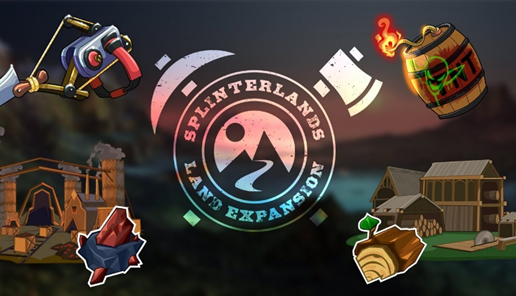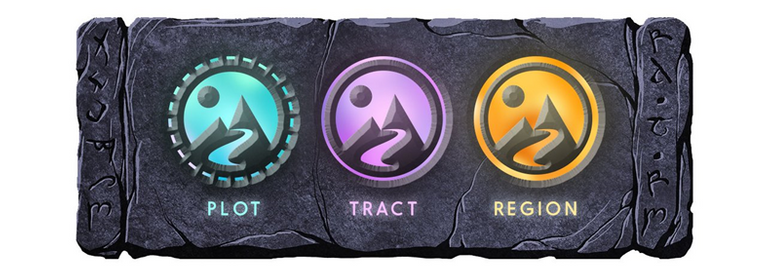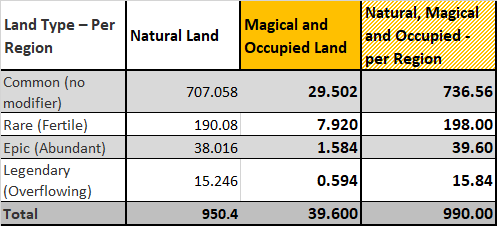Like real life explorers of old, anyone who has bought a piece of Splinterlands land has dreamt about what their land will look like.
Will I find a keep? A castle? Will I sit atop magical ley lines of a volcano? Or, will I be perpetually drying my waterlogged battlemage-feet because I live in a bog?
You ask the best questions! While there are not clear answers to your questions now, there are a number of hints and facts that have been given to us over the course of the last year about how land rarities may work. Taking this information into consideration, it’s possible to develop a hypothesis about what the chances are for the different land types.
And, since you’re so good at asking questions, what do you think of these questions? Do you think it is possible that there is a land type rarer than castles? Would that make those plots more valuable than castles and keeps? Keep reading my gentle Splinterlanders, keep reading.
For the Answers, Go to the Source

The Splinterlands team gave us a lot of clues about land after it was announced. This post about land expansion https://peakd.com/splinterlands/@splinterlands/splinterlands-land-expansion-details offers a number of insights that I’ll occasionally be quoting below.
To be clear – the model proposed here makes assumptions! But, that really should be expected since we have not been told everything yet. If you have thoughts about variations on or alternatives to this model, then please include them in the comments! I will step through the documented rationale that I use to justify the structure of the model first, so bear with me. Or your can jump ahead to the tables that I’ve added lower in the post.
Land Basics
We have been told that land is going to be divided into a variety of terrains. There was no mention of any of the terrains being more or less valuable, per se, than any others. So, if you end up getting a bog or badlands, don’t fret! Terrain appears to be less of a factor in value than some of the other characteristics. For this reason, terrain has been left out of consideration in the calculations provided below.
Here’s what the team said about terrain, just for your reading pleasure: “There are planned to be fourteen different terrain types in total: Plains, Hills, Tundra, Swamp, Bog, Mountain, Canyon, Caldera, River, Lake, Forest, Jungle, Desert, and Badlands.”
Land Categories
Land will be categorized into three different groups. Those three groups are: Natural, Magical, and Occupied. There were a few helpful comments about land categories that provided starting points for this model. “The category of land is similar to the "foil" of the existing Monster and Summoner cards and is indicated at the top of the card graphic. The majority of the land plots will be Natural lands…”
So, with this statement in mind, it’s possible to assert that the Natural lands will be the common cards. This is not that earth shattering – a lot of talk in the land expansion chat on the Splinterlands discord (join the conversation here: https://discord.gg/uAD3cyZK) have used this as a baseline.
Next, the team said that some of the land plots will be Magical and will have one of six magical resources that come from each of the splinters except for neutral. And, some of the plots will be Occupied “which means that they are inhabited by wild monsters”. I’ll come back to this comment in a moment.
And, then “Finally, each plot of land will also have a rarity - Common, Rare, Epic, or Legendary - just like the existing Monster & Summoner cards.” The rarity levels will be indicated, using naming modifiers to describe the amount of resources or number of monsters that will be found on the plot. These rarity level modifier names will match up like this:
No modifier – Common
Fertile – Rare
Abundant – Epic
Overflowing – Legendary
Returning to the comment previously made about Magical and Occupied land and how they factor in, the team makes one other comment from this helpful document that furthers construction of the model: “A land plot that is both Overflowing (Legendary rarity) and is either the Magical or Occupied category can be thought of as similar to a Gold Foil Legendary Monster or Summoner card.”
From these comments, we can conclude that Magical and Occupied lands are at least valued in the same tier as each other, and that lands that are designated Magical or Occupied and Overflowing could be considered the land-equivalents to Gold Foil Legendary (GFL) cards.

There are several things that we have been told that are mathematical characteristics of the regions: Each region will contain 1,000 plots and will have one castle and nine keeps. That means that 990 of the plots within any region are going to be “normal” plots; ie. no keep or castle. This allows us to start building a model. Since we know what 10 of the plots will be, we can start to estimate what the remaining ones will be comprised of.
Next, we know, based on some of this information, that the team is basing some of their mental constructs on a model similar to that which they have used for card packs. So, maybe it’s reasonable to guess that they use the same math to construct their land model as is used for card rarity.
One thing that complicates this a little bit is that there are two differing formulas used for pack openings. One is for those that are opened with potions, and the other for those that are opened without. The use or disuse of potions could be possible with land. And, while it may be possible to use a potion to increase the chances of bettering your land categories or rarities, for the purposes of this model, we will stick to one land pack opening set of statistics. We will use the math that is used for packs that are opened with potions.
As an aside – I cannot envision a scenario for the use of potions to increase the likelihood of opening castles and keeps. Unlike with card decks, there is a set number of castles and keeps. So, improving the odds for one plot would require co-opting RNG from another plot. Unless we are in for a pleasant surprise, there will not be the possibility to have a second castle or a keep in a tract, or two castles in a region, etc. so improving someone’s statistical odds of opening one of these on their plot, would necessitate extracting something from the odds of another plot or plots.
But, we digress! Back to our model. It’s possible to find out the rates that cards have dropped for each of the historical card sets on the Peakmonsters site: https://peakmonsters.com/packs. Across the history of the sets, drop rates appear to generally be pretty similar. Since it’s the most recent, we will use the numbers shown in the Chaos Legion pack statistics. Also, since it’s slightly more generous, we’ll use the drop rates that are used for packs opened with potions.
To give a little detail on what potions do: using a Legendary potion slightly reduces the likelihood of a common card and slightly increases the likelihood of a legendary one. (You can see for yourself how this functions on the Peakmonsters page that I linked.) Similarly, using a Gold potion slightly reduces the likelihood of receiving a regular foil of each rarity level and slightly increases the likelihood of getting that same rarity level in Gold foil.
Each edition of packs has historically contained the cards with the rarities found in column one of the below table. The drop rate for each rarity is in the second column. The third column expresses the pack drop rate as a percentage.
If we extrapolate the card drop rate into what it would mean for the number of natural lands found within a region, we get the fourth column. The last column just includes the name of the land rarity since we are no longer talking about monster/summoner cards.

If we do the same using the statistics for the gold foil cards, (Magical and Occupied lands), we get this second chart.

Finally, the combined charts with just the drop rates per region for land is shown below. The rightmost column is the total of Natural, Magical and Occupied Lands for each rarity type.

So, this means that in a typical region, of the 1,000 plots, there would be about 950 Natural (“regular foil”) plots of land ranging from common (no modifier) to Overflowing (Legendary). Of those “regular foil” plots, 707 within each region would have common rarity. 190 of them would be fertile; 38 Epic and 15 Legendary.
A King or Queen’s Home is their Castle Overflowing Magical Plot?
If this model is to believed, then you would need to own two regions to be statistically likely to have one of the Abundant (Epic) Magical or Occupied lands. It would also mean that there may not even be one Abundant Magical and an Abundant Occupied land plot per region! You may need to own two regions to get one of each of them!
And, don’t get me started with the Overflowing (Legendary) Magical and Overflowing Occupied lands! These are the ones that the team called the GFL's of the land claims.
There would be less that one per region, if the existing card model is used! Region holders may have to own four Regions to have a shot at getting both an Overflowing Magical and an Overflowing Occupied land plot! If the logic bears out, those plots would be rarer than castles themselves (almost twice as rare) and three times as rare as the keeps. It would put an interesting twist into the pricing that will be used when trading these plots. Would it mean that a justification could be made that these GFL plots are more valuable than the castles and keeps that have occupied our NFT dreams? Would someone actually ever trade a castle or keep to acquire one? I’ll be honest – I can not wait to find out!
I don’t have Rabies, I’m Just FOMO’ing at the Mouth
The lead up to townhalls has always been one of the times that my anticipation gets the best of me, and I typically have bought my land plots. At roughly $40,000 per tract, I’m not really in the market for the larger land purchases, and certainly not in the market for one of the Regions. Those have lived in the Wax marketplace at about $750,000. But, for those that are well-healed enough to buy now, does knowing that there may be a third category of land type that potentially outpaces the rarity of a castle or keep make you want to double down?
And, for those of us who are buying individual plots, what does the math mean? I just purchased my seventh plot this weekend. Statistically, if this model's numbers are to be believed, seven in ten plots will be common natural land. So, I feel just a wee a touch of FOMO creeping into my joints. Will an eighth plot alleviate the discomfort? Should I try to make it an even ten? Someone please call me a doctor!
Thanks for the numbers and interesting presentation! I suppose it wouldn't hurt to get "just one more" eh? 😄
for sure - just the one! I can stop any time!
Thanks for putting these numbers out here, even though only hypothetical, I liked the read.
Now that you have the tables ready, I'm looking forward to your post, when the SPL team will come with actual numbers ;)
Let's hope for the best! Good luck with your plots, and while you wait, have a !PIZZA
Thanks for reading and for the pizza - that’s a great idea! I’ll have to start working on my two versions. One entitled “Nailed It!” and the other one “Whelp, I’m an idiot.”
all good speculation and i can't wait for land to drop!
Congratulations @dangerbald! You have completed the following achievement on the Hive blockchain and have been rewarded with new badge(s):
Your next target is to reach 100 replies.
You can view your badges on your board and compare yourself to others in the Ranking
If you no longer want to receive notifications, reply to this comment with the word
STOPCheck out the last post from @hivebuzz:
PIZZA Holders sent $PIZZA tips in this post's comments:
@arkasz(1/10) tipped @dangerbald (x1)
Learn more at https://hive.pizza.
So difficult speculating on land. Good food for thought. TY
hope the ratio of EPIC and Legendary for lands are higher than that is for the cards simply because of the land only have 150K plots. give some hope to the small player who only has 1 plot. :)
One thought. You're assuming the rarities of plots will mimic the rarity of cards in packs; as you've mentioned.
What if the team decide that plot distribution should mirror the ratios of maxed cards in the game?
Hey Matt - I modeled out the answer to your question. I think we can all agree that your way would be far more desirable a calculation model! We'd have about 1/3 the number of common plots, and about 10x more legendary. GFL's would go from .06% to 2.10% - meaning we'd go from possibly having less than one per region to just over two! Here's the rest of the data.
Man, that's a really interesting way of looking at it! Especially now that there is some precedent being set with the Waka card coming out. So basically, what would the ratios look like with the same initial number of cards but assuming all became maxed? I am going to have to figure this one out! Thank you!